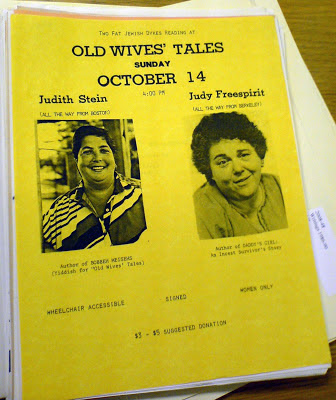After Dad died in August, I became the custodian of an archive of family photographs. I've been interested in feminist theory of family albums for a while, and I'm finding this collection of pictures to be really rich and powerful in terms of making sense of my own life.
I encountered a different kind of family archive when I was gathering material for my PhD about fat activism. I spent quite a bit of time in various archives, looking at evidence of fat feminist activism in objects and papers that had been donated by fat activists over the years. Because fat activism is relatively poorly documented, the archive is the place to be if you want to find out anything. I found handling, looking at, and reading the things I found in the archive to be very moving and exciting. Here was evidence that I'm not making this stuff up! It felt powerful to see myself within a continuum of activists.
Some archives let you take pictures of what you find, and so I have a little archive of fat feminist archival material on my computer. I thought I'd share some of it here. Because it's impossible to pick out the best stuff, I've just dipped in randomly.
This first item is a flyer for a reading by Judith Stein and Judy Freespirit. The year isn't mentioned but I did a bit of digging and I think it's 1984. I'm intrigued that these two women are billed as Two Fat Jewish Dykes. I know that Jewish dykes at this time, including Stein and Freespirit, were at the heart of fat feminism in the US. There had been a Jewish Feminist Conference in San Francisco in 1982 where Stein, and probably others, had circulated a sheet about fat oppression for discussion. Fatness and Jewishness were present amidst a broader lesbian feminism at that time, I think of this as an early attempt to articulate intersectionality in identity politics.
Other aspects of the framing of this reading seem odd to me in 2012. Dyke, although a term I use for myself because of its politicised, queer and unapologetic undertones, seems somewhat archaic. I don't hear many women, trans included, refer to themselves as dykes any more. The references to oldness, Old Wives' Tales, Bobbeh Meisehs, which is a Yiddish term also meaning old wives' tales, also strike me as odd. Queerness has become associated with youth, I think, and ageism makes it hard to imagine younger or middle-aged people playing with ideas around being old.
I like the way the flyer is copied on yellow paper, very eye-catching. I love the 'All the way from Boston and Berkeley' joke. I can imagine seeing it on a noticeboard somewhere, actually probably somewhere that doesn't exist any more, like a feminist bookshop, or a lesbian café. Maybe somewhere like Old Wives' Tales, the venue for the reading that also no longer exists. This was a bookshop on Valencia Street in San Francisco. It closed its doors for the last time in 1995, after about 20 years in business. Stein and Freespirit's reading presumably took place during its heyday.
Here are some links about the venue that offer some context for the reading:
- Found SF: Carol Seajay, Old Wives Tales and the Feminist Bookstore Network
- Claire Schoen Media: Old Wives' Tales
- Lost Womyn's Space: Old Wives Tale(sic) Bookstore
- SFMOMA Open Space: We thought the world we built would be forever: An Interview with Lenn Keller
- Online Archive of California, GLBT Historical Society's archival holdings for Old Wives' Tales Bookstore
This flyer represents to me the friendship between Stein and Freespirit, one I find inspiring. This was a political friendship, a working friendship as well as a genial and sociable relationship, perhaps a romantic one at some point too. They lived on opposite sides of the United States, they wouldn't have had the internet to help them, and they managed to maintain their friendship regardless. They produced fat feminist activist interventions together, by themselves, and with other people.
For this event they are both reading from small press publications. I'm not sure if Daddy's Girl was ever published, I think Freespirit had trouble finding a publisher and circulated some copies of it herself, but I can't be sure. I recall there is a manuscript in the GLBT Historical Society archive. Stein published Telling Bobbeh Meisehs: Notes on Identity and the Creation of Jewish Lesbian Culture, herself in Cambridge Massacusetts in 1982. This would have been before the explosion of popularity in feminist desk top publishing and zine-making in the early 1990s. It was more a scene of chapbooks and small-circulation journals.
Stein's shirt is quite something on this flyer/poster, I wish it was in full colour. Funny, too, to see her and Freespirit with dark hair when I know them as older grey-haired women. Freespirit's expression is intriguing, she looks like someone who can tell a story, which is true, she really could. When I think of her reading her account of abuse to an audience, I think of that everyday, taken-for-granted bravery of speaking that I was lucky enough to grow up with, but which nevertheless is remarkable and courageous. It makes me want to thank her, and other people like her, who continue to speak out.
The last few details of the object are about the conditions in which the reading took place. The venue is wheelchair accessible, calloo callay! Signed too! From my vantage point of London 2012, I can say that access for disabled people has dropped off the radar of radical queer life, not that venues are entirely forthcoming, and that this is depressing and needs to change. The sliding scale also rocks, though I have quite a lot of ambivalence about it being Women Only.
Remembering Judy Freespirit














